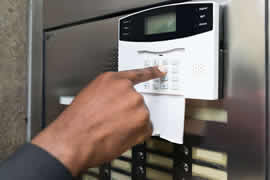Access Control Systems
Electronic Access Control provides an efficient and cost effective solution to securing your property and protecting your staff and assets.
By replacing mechanical locks and keys with an Access Control system you can substantially increase your site security. Electronic proximity fobs or cards cannot be copied and if lost they can simply be erased from the system and replaced.
Intercom systems, Card/fob readers, Code-locks and Biometric devices can all be utilised to provide an effective access control solution.
Creative Security Dynamics specialize in the following Access Control solutions:-
Stand alone and multiple door I.P based systems
As approved installers of Gallagher Command Centre and Paxton Net2/Net10 Access Control systems no matter what your requirements are rest assured that Creative Security Dynamics will have the solution for you. From single door stand alone systems to P.C/server based I.P systems protecting hundreds of doors we only use the highest quality system components available. This ensures that no matter what your requirements are the system we design and install will be built to last.
Video/Audio Intercom Systems
Usually installed on perimeter and secure entrances and in conjunction with an electronic Access Control system, Intercoms provide a secure way for staff to remotely verify and allow entry to authorised visitors.
Intercom systems can be Audio only or Video & Audio and they’re available in several formats including Analogue, Digital, Vandal resistant and DDA compliant.
Concierge
Concierge systems are normally installed in larger scale apartment or shared accommodation blocks, they are similar in operation ti Intercom systems whereas they provide a secure way for tenants to remotely verify and allow entry to authorised visitors, however Concierge systems are centrally controlled from the Concierge position and provide intercommunication between the Concierge and the apartments and vice versa.
Biometrics – The future of Access Control?
Creative Security Dynamics recognise Biometric technology as the future of Access Control therefore we are constantly evaluating current and new products to ensure that we are at the fore front of knowledge when it comes to designing Biometric based systems.
The most common forms of Biometric controlled access control systems use fingerprint recognition, hand geometry, facial recognition, iris recognition or voice recognition however there are behavioural biometric forms such as signature identification and verification.
Time and Attendance
Using Access Control technology we can provide a comprehensive Time and Attendance solution allowing the collation of all staff attendance to allow automatic calculation of wages complete with exports in formats easily imported into seamlessly HR/Payroll software.
Automatic Doors, Gates & Barriers
Recent Health and Safety Executive Machinery Directives are now law. These relate to crushing, entrapment and collision. It is now a criminal offence not to protect against these. It is a legal responsibility to ensure that systems are installed and maintained to these directives.
Creative Security Dynamics can provide design, installation and aftercare of automatic doors, gates and barriers to ensure these legal objectives are met and maintained.
DDA Compliant Solutions
Creative Security Dynamics can provide bespoke Access solutions to ensure DDA (Disability Discrimination act) Compliance by utilising entrance automation combined with dual height, visible, audible and physical technologies to ensure accessibility to people with visual, hearing or physical disabilities.
DDA explained
Access to goods, services and the wider environment
Part 3 of the Disability Discrimination Act (DDA) gives disabled people important rights of access to everyday services.
Services might include those provided by local councils, doctors’ surgeries, shops, hotels, banks, pubs, theatres, hairdressers, places of worship, courts, and voluntary groups such as play groups. Non-educational activities provided by schools would also be included.
In April 2005, a new Disability Discrimination Act was passed by Parliament which amends or extends existing provisions in the DDA 1995. Some of the new laws will come into force in December 2005, and some in December 2006.
Reasonable adjustments and current law
Since October 1999, service providers have had to consider making reasonable adjustments to the way they deliver their services so that disabled people can use them. Making ‘reasonable adjustments’ means:
Changing any practice, policy or procedure which makes it impossible or unreasonably difficult for disabled people to use a service (eg waiving a no dogs policy for blind customers accompanied by their guide dog)
provide an auxiliary aid or service which would enable disabled people to use a service (eg providing a British Sign Language interpreter at a public meeting where deaf people will be present)
overcoming a physical feature by providing services by alternative methods.

